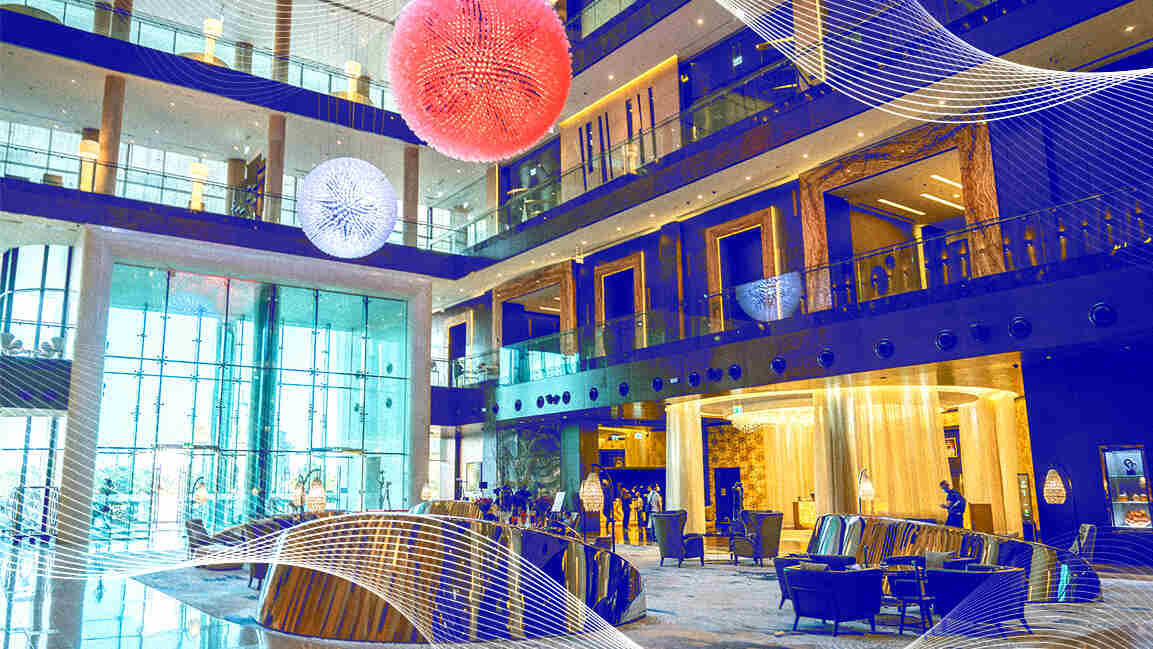- | 10:00 am
What’s shaping the future of the Middle East’s hospitality industry? Hyatt’s Stephen Ansell tells us
Stephen Ansell, managing director of Hyatt, Middle East, and Africa, discusses the rise of technology and the growing demand for personalized and unique travel experiences.

The Middle East’s hospitality industry is poised for accelerated growth as it rides a wave of increased tourism, infrastructure development, major events, and growing demand from both corporate and leisure travelers.
While Saudi Arabia’s vision-led projects, such as NEOM, Diriyah Gate, and The Red Sea Project, are reshaping the tourism landscape, the UAE is seeing record-breaking visitor numbers.
Dubai welcomed 18.72 million international visitors in 2024, a 9% increase from the previous year. According to the Dubai Department of Economy and Tourism, this new figure surpasses the city’s record of 17.15 million visitors in 2023.
According to Stephen Ansell, Managing Director, Hyatt, Middle East and Africa, the GCC standard tourism visa will further unlock seamless regional travel, boosting demand for premium hospitality experiences.
“Wellness and sustainability are also becoming major drivers, with properties like Alila Hinu Bay and Alila Jabal Akhdar setting new benchmarks for eco-conscious luxury and wellbeing-focused travel.”
PORTFOLIO GROWTH
With Hyatt’s expanding presence in key markets, Ansell says the focus is guest personalization and service excellence. “We are positioned to act on this momentum and deliver world-class experiences across the region.”
Hyatt has many upcoming and recently opened properties in the region, resulting in its luxury, lifestyle, and well-being portfolio growth in the Middle East.
Recently, it announced the opening of Andaz Doha, the third Andaz hotel in the Middle East. One of the most anticipated openings for Hyatt in the Middle East is the Grand Hyatt The Red Sea, the first Grand Hyatt property on Shaura Island.
“We are also excited to open Miraval The Red Sea on the island, which will offer guests the first international experience of the luxury wellness brand outside of the US,” says Ansell.
In the UAE, later in 2025, Hyatt will expand its leisure offerings in Dubai, with the waterpark opening at Grand Hyatt Dubai.
TECHNOLOGY AND PERSONALIZED EXPERIENCES
Across the hospitality industry, over the past few years, the focus has been on technology owing to changing consumer preferences and market dynamics. From incorporating smart room features to exceptional guest management systems, hotels are leveraging technological tools to enhance efficiency, streamline operations, and deliver more personalized experiences.
At Hyatt as well, Ansell adds, technology integration is pivotalle in enhancing guest experiences, from seamless digital check-ins to AI-driven personalization that tailors the stays to individual preferences.
“At the same time, we want our guest interactions with us to be experiential, not transactional, so we utilize technology to enhance and personalize their experiences without removing the human touch of hospitality.”
And as investments in new technology continue, hotel operators have realized that personalized service, creating special experiences, are powerful drivers of guest loyalty and retention, boosting business growth.
The modern traveler, Ansell says, seeks more than just a place to stay.
“They desire experiences that resonate with their interests and lifestyles. At Hyatt, personalization is at the heart of what we do. We offer the benefits of a global network yet remain nimble enough to create true personal connections with our customers.”
Through guest insights and data-driven strategies, the multinational hospitality company plans and executes any meeting, event or trip for guests, based on their needs and stay occasion, he adds.
Ansell says Hyatt honors its legacy of authentic hospitality while embracing innovation. “Each of our properties celebrates local culture and history while integrating technology and forward-thinking initiatives in their daily operations and activities.”
LOYALTY PROGRAMS
The last few years have been a trip for travelers, craving new experiences, while tackling enough challenges all around – high prices, long delays – to make them wonder if leaving home was even worth it.
To solve customer pain points, there’s a loyalty program boom. Companies eager to learn more about customers started collecting and analyzing data based on their preferences and personal information.
Customer attitudes have evolved, and Ansell says, “Today, loyalty extends beyond traditional rewards; it’s about recognition, personalization, and meaningful engagement with members.”
Loyalty programs are rising in importance to consumers. And the hospitality industry players are also leaning on loyalty programs to help lend a more personal touch to tcustomer interactionsrs.
The World of Hyatt loyalty program, which is designed to evolve with guest expectations, offering curated and well-being experiences that add more value for members, reached approximately 54 million members in 2024. “This demonstrates the strength of our commercial offerings for our guests,” he adds.
THE FUTURE OF THE INDUSTRY
The hospitality industry is a notoriously difficult industry. As a several billion dollar industry encompassing everything from restaurants and bars, to hotels, and amusement parks, there is no “one size fits all” method of finding success.
As major players in the industry seek to increase revenue, lower costs and increase loyalty, disruptive forces are sweeping the hospitality landscape. Technology, sustainability, and evolving traveler preferences are shaping the future of the industry, according to Ansell. “AI-driven hyper-personalization, sustainable tourism initiatives, and blending business and leisure travel are already transforming the industry.”
“For example, in the Middle East, sustainability is at the forefront of change. The Red Sea Project is pioneering regenerative tourism, setting a new standard for eco-conscious luxury. Additionally, Saudi Arabia’s Vision 2030 and the UAE’s commitment to sustainability initiatives are influencing hotel operations, from energy-efficient design to waste reduction programs,” he adds.
As wellness becomes a key factor in travel decisions, Ansell says the industry must evolve to meet guests’ needs. “At Hyatt, we see these factors as opportunities. Whether through integrating well-being experiences, enhancing sustainability efforts, or pioneering new guest-centric technologies, we remain focused on delivering care in an authentic way that meets the needs of travelers and shapes a bright future for hospitality.”







































